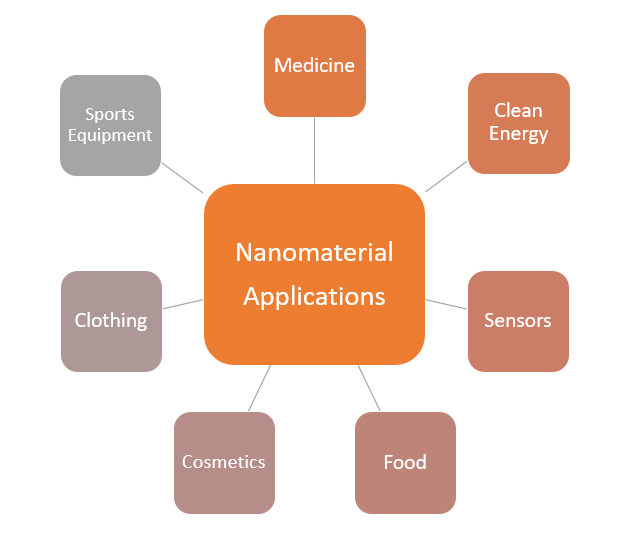Nanomaterials: To use or not to use
The following learning module was created by Dr. Elizabeth Moore '19 as a student for public teaching use.
Nanomaterials are increasingly used in a variety of products and technologies because of their size and unique properties. However, the impact of nanomaterials on ecosystems is a new area of investigation for scientists and offers an opportunity for original and authentic investigations. This investigation will introduce students to nanomaterials, their life cycle, methods of research and the possible impacts of nanomaterials on the ecosystem. Students will also contribute their learning to the public’s understanding of nanomaterials.
Target Class/Grade Level
This content can be used for a high school Living Environment class (complies with Regents exam) or as part of the curriculum for AP Environmental Science. We believe the material can also be adopted for middle school science courses. Suggestions are provided for ways to adapt and/or expand upon these lessons.
Duration
3-4 Weeks
Learn more about this project and its results

Essential Research Questions
- What are nanomaterials?
- Where do nanomaterials come from?
- How small is a nanomaterial?
- Why are nanomaterials used in products and technologies?
- What do nanomaterials do?
- Where do nanomaterials go and how do they get there?
- What do nanomaterials do when they get into the environment?
- What are the potential environmental and health risks of using nanomaterials?
- Should we continue using nanomaterials?
- Who is studying nanomaterials and how are they studying them?
Learning Targets
- I can explain what a nanomaterial is and why they are used.
- I can visualize the nanoscale.
- I can explore the life cycle of nanomaterials and identify which products/technologies use nanomaterials
- I can evaluate the impact of nanomaterials on ecosystems
- I can define potential benefits and risks of nanomaterials
- I can design, execute, and analyze the results of a scientifically rigorous experiment.
- I can create a final product that communicates my nanomaterial learning.
- I can apply what I have learned about nanomaterials to an overall understanding of pollution and the flow of materials in an ecosystem.
- I can decide to use or not to use.
 This work was supported by the U.S. National Science Foundation (CBET- 1438280 and CBET-1254688).
This work was supported by the U.S. National Science Foundation (CBET- 1438280 and CBET-1254688).
Understandings of the Nature of Science
- Science investigations use diverse methods and do not always use the same set of procedures to obtain data.
- New technologies advance scientific knowledge.
- Scientific inquiry is characterized by a common set of values that include: logical thinking, precision, open-mindedness, objectivity, skepticism, replicability of results, and honest and ethical reporting of findings.
- The discourse practices of science are organized around disciplinary domains that share exemplars for making decisions regarding the values, instruments, methods, models, and evidence to adopt and use.
- Scientific investigations use a variety of methods, tools, and techniques to revise and produce new knowledge.
- Science and technology may raise ethical issues for which science, by itself, does not provide answers and solutions.
- Science knowledge indicates what can happen in natural systems—not what should happen. The latter involves ethics, values, and human decisions about the use of knowledge.
- Many decisions are not made using science alone, but rely on social and cultural contexts to resolve issues.
- Science is a unique way of knowing and there are other ways of knowing.
- Science distinguishes itself from other ways of knowing through use of empirical standards, logical arguments, and skeptical review.
- Science knowledge has a history that includes the refinement of, and changes to, theories, ideas, and beliefs over time.
- Scientists often use hypotheses to develop and test theories and explanations.
- Scientific argumentation is a mode of logical discourse used to clarify the strength of relationships between ideas and evidence that may result in revision of an explanation
- Science arguments are strengthened by multiple lines of evidence supporting a single explanation.
- Science knowledge is based on empirical evidence.
- Science disciplines share common rules of evidence used to evaluate explanations about natural systems.
Influence of Engineering, Technology, and Science on Society and the Natural World
- Modern civilization depends on major technological systems, such as agriculture, health, water, energy, transportation, manufacturing, construction, and communications.
- Engineers continuously modify these systems to increase benefits while decreasing costs and risks.
- New technologies can have deep impacts on society and the environment, including some that were not anticipated.
- Analysis of costs and benefits is a critical aspect of decisions about technology.
The nanomaterial module and lesson plans were created through collaborations with the Golisano Institute for Sustainability at RIT, the College of Science at RIT, and the World of Inquiry School No. 58 in Rochester, NY.
- Dr. Callie Babbitt (Associate Professor, RIT)
- Dr. Christy Tyler (Associate Professor, RIT)
- Christopher Widmaier (Environmental Science Teacher, WOIS)
- Elizabeth Moore (PhD Candidate, RIT)
- Sarah Ponte Cabral (MS Student, RIT)
- Charles Border (MS Student, RIT)





